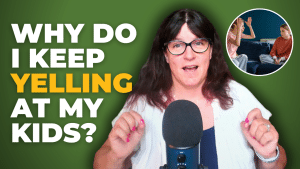
As parents, we’ve all been there—finding ourselves raising our voices, frustrated, and wondering, Why do I keep yelling at my kids? We don’t set out to be the kind of parent who yells, yet time and time again, we get to the point where it feels like the only option. In today’s post, I want to dive deep into why this happens and how we can shift away from this pattern.
Why Do We Yell?
It’s easy to say that we yell because our kids aren’t listening, or because we’re at our wits’ end. But what’s really going on beneath the surface? One of the main reasons is that yelling works—at least in the short term. When we raise our voices, we often see immediate results. The kids might snap to attention, put on their shoes, or stop whatever behavior was frustrating us.
But here’s the truth: Yelling only works temporarily, and the more we rely on it, the less effective it becomes. The real reason we end up shouting more often than we’d like is that we’re triggered. When we’re triggered, we’re no longer reacting to the situation in front of us. Instead, we’re reacting to something deeper—an emotional response rooted in our own past experiences or learned behaviors.
As I share in this episode, when we explode at our kids, it’s often because we’re overwhelmed, stressed, or reminded of something we experienced ourselves as children. Maybe you grew up in a household where you didn’t question authority, and now, when your child doesn’t listen, it brings up feelings of disrespect or anxiety.
What Happens When We’re Triggered?
When we’re triggered, our bodies go into what’s called a fight-or-flight response. Biologically, we’re reacting as though we’re under threat, even though the “threat” in front of us might just be a child not putting on their shoes after the 14th reminder. We become hyper-focused on the behavior, and our frustration can quickly escalate. As I say in the episode, “You’re no longer reacting to the child in front of you—you’re acting from what you learned as a kid or reliving something that made you feel unsafe.”
This is why it’s so important to recognize when we’re triggered and to find ways to ground ourselves in the moment. Asking, What’s real right now? is a powerful way to bring yourself back to the present. When you realize your child isn’t trying to disrespect you, but may be tired, anxious, or overwhelmed themselves, it’s easier to respond with empathy rather than frustration.
What Can We Do in the Moment?
In those heated moments, when you feel the yelling building up, the first step is to pause. I know—it’s not always easy to take a breath and calm down when you’re running late or dealing with chaos. But stepping away, even for a minute, can help you reset. If you can’t physically leave the situation, try some grounding techniques, like taking a few deep breaths, closing your eyes, or even giving yourself a “butterfly hug”—placing your hands on your opposite arms and gently rubbing to soothe yourself.
Here’s an example I shared in the episode: “In those moments, we need to ask ourselves, What’s real right now? Because when we’re triggered, our nervous system doesn’t know the difference between a real threat and a perceived one. By stepping back and grounding ourselves, we can react to the actual situation in front of us instead of our past emotions.”
Once you’ve calmed yourself, it’s easier to get curious about what’s really going on with your child. Maybe they’re not listening because they’re anxious about something at school, or maybe they just need a moment of attention from you. By understanding their needs, you can address the root cause of the behavior rather than reacting to the surface-level frustration.
The Power of Repair
No matter how hard we try, we’re going to yell sometimes. That’s part of being human. The key is in how we handle things after those moments. Repairing the relationship with your child after a yelling episode is crucial. It shows them that while we all make mistakes, our love for them is unconditional.
I’ve found that an apology, followed by an explanation, can go a long way in healing any hurt feelings. Something like, “I’m sorry for yelling earlier. I know that must have scared you. I was frustrated because we were running late, and I didn’t handle my emotions well.” This not only reassures them but also models healthy emotional regulation.
As I mention in the episode, “The most important part of this process is the repair. What you’re saying to them is, You are okay. Even though we had a conflict, I still love you, and I will always show up for you.” This teaches our kids that even though we might have tough moments, our relationship remains strong.
How to Stop Yelling as Often
So, how do we stop yelling at our kids so much? The real answer lies in changing ourselves. We need to shift our focus from controlling our kids’ behavior to managing our own reactions. This isn’t about perfection—it’s about progress. It’s about building better habits, taking time to reflect, and being kind to ourselves when we fall short.
One practical step is to get curious about what triggers you. What patterns do you notice? Are there specific times of day when you’re more likely to yell—like in the mornings when everyone is rushing, or in the evenings when everyone is tired? Identifying these patterns can help you prepare for those situations and find better ways to manage them.
I shared a story in the episode about how I used to struggle with my kids’ bedtime routine. I’d get frustrated when they’d run around and roughhouse when I expected them to wind down. But when I realized that this was their way of releasing energy, I stopped fighting it and adjusted our schedule to allow for those “zoomie” moments. Once I did that, bedtime became less of a battle and more of a time to connect.
Support is Key
One thing I’ve learned is that you don’t have to do this alone. We all need support to navigate the challenges of parenting. Whether it’s leaning on friends, family, a therapist, or a parenting coach, having a support system makes a world of difference. As I shared in the episode, “I was able to get through those tough moments because I had a great group of friends and family, and I reached out for help when I needed it.”
If you’re struggling with yelling, know that you’re not alone, and it’s okay to ask for support. I hope this blog post and the episode offer you some comfort and practical strategies. Remember, the goal isn’t to stop yelling altogether—that’s not realistic. The goal is to understand why it happens, take steps to reduce it, and build stronger connections with our kids along the way.
Feel free to reach out if you have any questions or need more guidance. We’re all in this together, and I’d love to support you on your journey to calmer, more connected parenting.
If you want more tips on handling triggers and building a peaceful home, be sure to check out the full podcast episode and subscribe for more insights!





